 Petzlover
Petzlover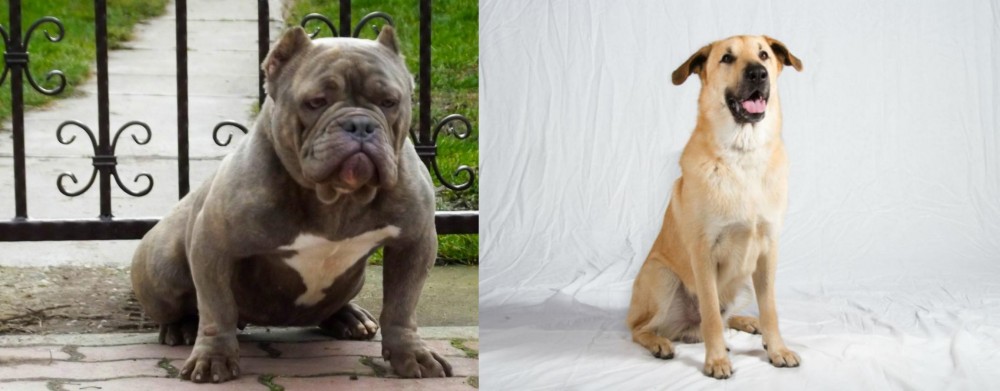 Both American Bully and Chinook are originated from United States. American Bully may grow 19 cm / 7 inches shorter than Chinook. American Bully may weigh 9 kg / 20 pounds more than Chinook. American Bully may live 3 years less than Chinook. Both American Bully and Chinook has almost same litter size. American Bully requires Low Maintenance. But Chinook requires High Maintenance
Both American Bully and Chinook are originated from United States. American Bully may grow 19 cm / 7 inches shorter than Chinook. American Bully may weigh 9 kg / 20 pounds more than Chinook. American Bully may live 3 years less than Chinook. Both American Bully and Chinook has almost same litter size. American Bully requires Low Maintenance. But Chinook requires High Maintenance
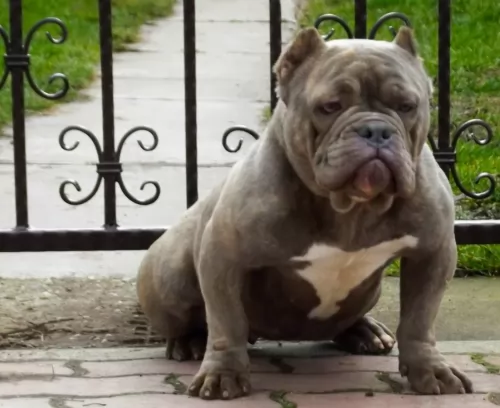 The American Bully breed was founded in the United States in the mid of 1990s also recognized by the United Kennel Club on July 15, 2013. They are augmentation from the American Pit Bull Terrier breed. The ultimate goal of creating this breed was the best family companion. They are selective breeding which means the characteristics and their temperament are artificial ones. So they are influenced by several other breeds like English Bulldog and Olde English Bulldog. Even though they are selective breeding, they possess the peculiar temperament is ultimate companion to their owners.
The American Bully breed was founded in the United States in the mid of 1990s also recognized by the United Kennel Club on July 15, 2013. They are augmentation from the American Pit Bull Terrier breed. The ultimate goal of creating this breed was the best family companion. They are selective breeding which means the characteristics and their temperament are artificial ones. So they are influenced by several other breeds like English Bulldog and Olde English Bulldog. Even though they are selective breeding, they possess the peculiar temperament is ultimate companion to their owners.
 In the early 20th century, in the small town of Wonalancet, New Hampshire a new breed of dog called the Chinook was born. Developed by Arthur Treadwell Walden, the breed is named after the first male ancestor who was named Chinook. The breed is a rare sled dog and the official dog of the state of New Hampshire. The Chinook was born of a cross between a large Mastiff-like street dog and huskies that were part of the Peary North Pole expedition.
In the early 20th century, in the small town of Wonalancet, New Hampshire a new breed of dog called the Chinook was born. Developed by Arthur Treadwell Walden, the breed is named after the first male ancestor who was named Chinook. The breed is a rare sled dog and the official dog of the state of New Hampshire. The Chinook was born of a cross between a large Mastiff-like street dog and huskies that were part of the Peary North Pole expedition.
Walden was an experienced slender and looking for a dog that was stronger, faster and had more stamina than his current sled dogs. Walden had years of experience including being the trainer and lead on Byrd’s 1929 Antarctic expedition and plenty of Yukon experience. Once he had the male Chinook he bred him with German Shepherds, Belgian Sheepdogs and Canadian Eskimo Dogs at the very least. He then bred those puppies back to Chinook until he had the type and traits he wanted. Following Walden, Julia Lombard and then Perry Greene took over mastery of the breed. From the 1940’s until he died in 1963, Greene was the only person who was breeding Chinooks. So, there were few left after his death. The breed neared extinction by 1981 with only 11 Chinooks available to breed. These dogs were divided between three breeders who saved the breed from becoming extinct.
In 1991, the United Kingdom recognized the Chinook and they were also registered with the UKC. At that time there were about 800 dogs in the breed. To increase the breed, there was a cross-breeding program that took Chinooks and bred them back to the breeds they considered to be apart of the original Chinook lineage. These 4th generation dogs might meet the standards of the Chinook Owners Associations Cross Breeding Program and be accepted as purebred.
In 2001 the Chinook was entered into the AKC Foundation Stock Service and added to the Miscellaneous class of the AKC in 2010. In January of 20113, the Chinook was finally granted full recognition and breed status within the AKC in the working group. He is a large working dog, rugged, patience, loyal and intelligent. He is one of the rarest breeds in the AKC.
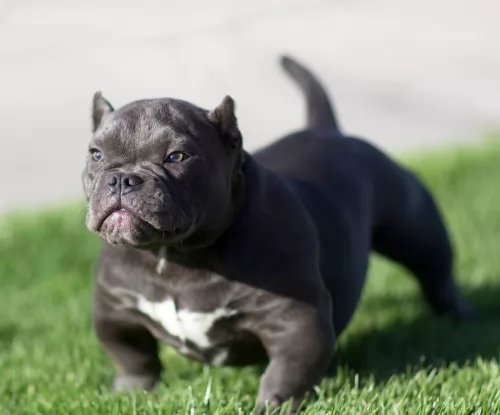 They have proper muscle tone. They are a good family dog. They are very active and agile because of their head and body proportion are balanced. Even though they are a smooth coat dog, they have a great strength because of their size. The super power of this dog possess tremendous stamina and power. An ultimate are essential for maintain the proper muscle tone and also avoid the gain of overweight. The American Bully dog possesses the intense energy to do well in performance and showcase their talents in the events.
They have proper muscle tone. They are a good family dog. They are very active and agile because of their head and body proportion are balanced. Even though they are a smooth coat dog, they have a great strength because of their size. The super power of this dog possess tremendous stamina and power. An ultimate are essential for maintain the proper muscle tone and also avoid the gain of overweight. The American Bully dog possesses the intense energy to do well in performance and showcase their talents in the events.
There are four kinds of American Bully. Each and every breed has minor difference in their appearance also characteristics. They are,
They have medium and large size compact body than the other varieties. The impression of this dog gives little bit rough and tough. But their behaviour is so gentle and also easily mingle with the people and fellow dogs.
The Classic kind is the inspired American Bully. They are light weight than the other varieties. So they have lighter body and less body mass. They have bones substance only not in buff.
The pocket bully possess the same characteristics and appearance of Standard bully. But the only one difference between both of us is height. The pocket bully is shorter than Standard. Even though it is a pocket bully it does not fit in anyone’s pocket, just for kidding.
Extra Large bully have heavily muscled. So they are very impressive according to the appearance wise. This is also similar to the Bully Standard, they are same in characteristics, temperament and appearance. They are easily weight gaining.
UKC- United Kennel Club
APBT- American Pit Bull Terrier
 The Chinook is a muscular dog, making him a perfect fit to be a sled dog or a hauler of any type. He has a deep chest and powerful muzzle with enduring teeth. The ears can be pricked up or bent and wind-blown. The nostrils of the Chinook are solid black and wide, while the lips are black, the eyes look like almonds and are dark with intelligence in their glance. The feet are firm and oval, the pads cushioned and with dark pigmentation. The tail should not be docked.
The Chinook is a muscular dog, making him a perfect fit to be a sled dog or a hauler of any type. He has a deep chest and powerful muzzle with enduring teeth. The ears can be pricked up or bent and wind-blown. The nostrils of the Chinook are solid black and wide, while the lips are black, the eyes look like almonds and are dark with intelligence in their glance. The feet are firm and oval, the pads cushioned and with dark pigmentation. The tail should not be docked.
The breed has a double coat and hair of medium length The undercoat is soft and thick while the outercoat is close to the body and coarse. The Chinook is usually a tawny, reddish color.
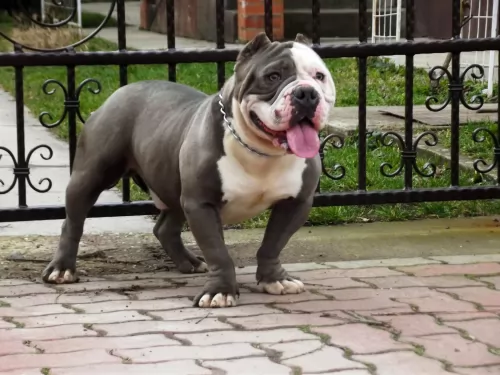 The American Bully is ultimate family companion. They are very loving and gentle with the people and their fellow dogs. They are extremely affectionate with family members.
The American Bully is ultimate family companion. They are very loving and gentle with the people and their fellow dogs. They are extremely affectionate with family members.
This breed is the best companion also obedient to their owners. It is very intelligent because they have a decision caliber. If anyone make harm to their master, it will aggressive and ready to bite those people. This breed possesses the loyalty and amiable.
They are love to play with kids. This breeder have unique character like extreme tolerance with children. Even though it may be calm in nature, you have to frequently monitor while playing kids with dogs.
The breed is versatile and capable of accomplishing a wide variety of tasks. Like Frisbee, swimming, hide and seek and throw ball. If athlete train the dog they are perform and showcase their talents in the events. Even though they are outgoing dogs, they strictly follow their rules instruct by the master. They are obedient and trustworthy.
American Bully will do okay in an apartment living. Even though they live in moderate weather, they prefer warm climates only. They are love to live with people or even fellow dogs.
 This is a playful, affectionate and loyal breed. They have a special love for kids and always want to learn and please you. They are intelligent and very trainable. The Chinook is good with other dogs and as a sled dog they love to work in packs. They can be reserved but they are never aggressive or shy.
This is a playful, affectionate and loyal breed. They have a special love for kids and always want to learn and please you. They are intelligent and very trainable. The Chinook is good with other dogs and as a sled dog they love to work in packs. They can be reserved but they are never aggressive or shy.
 Some bully breeders give drugs to their dogs. For the purpose a large muscular body and glossy hair. When the drugs are stopped the dog’s body shrinks back down to a normal size and the hair fall may happen. But it will made many health issues to their dogs, especially it will create organ and joint problems. So better to avoid the usage of drugs.
Some bully breeders give drugs to their dogs. For the purpose a large muscular body and glossy hair. When the drugs are stopped the dog’s body shrinks back down to a normal size and the hair fall may happen. But it will made many health issues to their dogs, especially it will create organ and joint problems. So better to avoid the usage of drugs.
Sometimes drug’s impact can passed from mother to puppy. If you are adopt a puppy in the market be sure you can find a drug free dog. It will be avoid heritage issues also.
If the Bully have Cherry colour eye, are often affecting by the ectropion and entropion disease. It causes the eyelid is turned outwards away from the eyeball.
 For the most part, the Chinook is a healthy dog. There are however some issues they do have to contend with including:
For the most part, the Chinook is a healthy dog. There are however some issues they do have to contend with including:
Sometimes know as Chinook seizures this is really a movement disorder and perhaps not a true epilepsy.
This dermatitis may be hereditary. It causes itchy skin and is actual an immune system issue.
Chinook are known for a variety of gastrointestinal disorders manifested by diarrhea and vomiting.
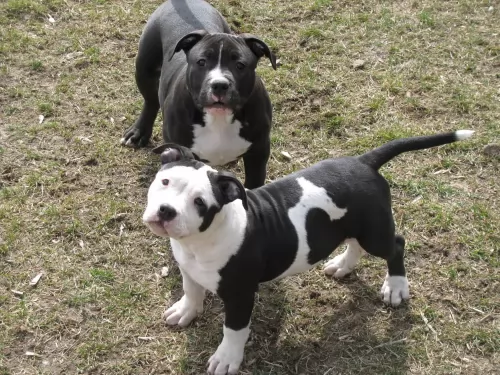 This breed is naturally have glossy hair. So we can easily groom it. If we are using the dry shampoo and brush the hair as necessary for improve the hair’s health. After bathe rub with a piece of towel because this breed is average shedder.
This breed is naturally have glossy hair. So we can easily groom it. If we are using the dry shampoo and brush the hair as necessary for improve the hair’s health. After bathe rub with a piece of towel because this breed is average shedder.
Vaccination should be the top priority for pets. It will prevent the dogs from rabies. Keep the health check-ups frequently at least once a year.
The worms can easily affect our breed. But we are not easily found unless bully avoid having the food and also checking bully’s waste matter. De-Worming can be prevent by checked every three months to the veterinarian.
Vitamin supplements can help your bully’s nutritional health. There are a lot of vitamin supplements are available in market, but we recommended choosing the best American Bully supplements. The best food for bully needs quality meats that contains high protein rich and fat.
Keep doing exercise is improve the bully’s physique. They are very interested to chase Frisbee. But swimming and walking will be good for them. They are keen bond with master and their family members also like to play with fellow dogs.
 Don’t overfeed your dog. Based on how hard he is working for you feed twice a day. Dividing 3 to 5 cups into two meals.
Don’t overfeed your dog. Based on how hard he is working for you feed twice a day. Dividing 3 to 5 cups into two meals.
Although the Chinook is still active in recreational sledding, he is mostly a family pet these days. Given this the Chinook need a good deal of exercise and competition. They are great at search and rescue, dog packing, agility, obedience, herding, carting and skijoring. They need some form of solid exercise for 30 to 60 minutes every day.